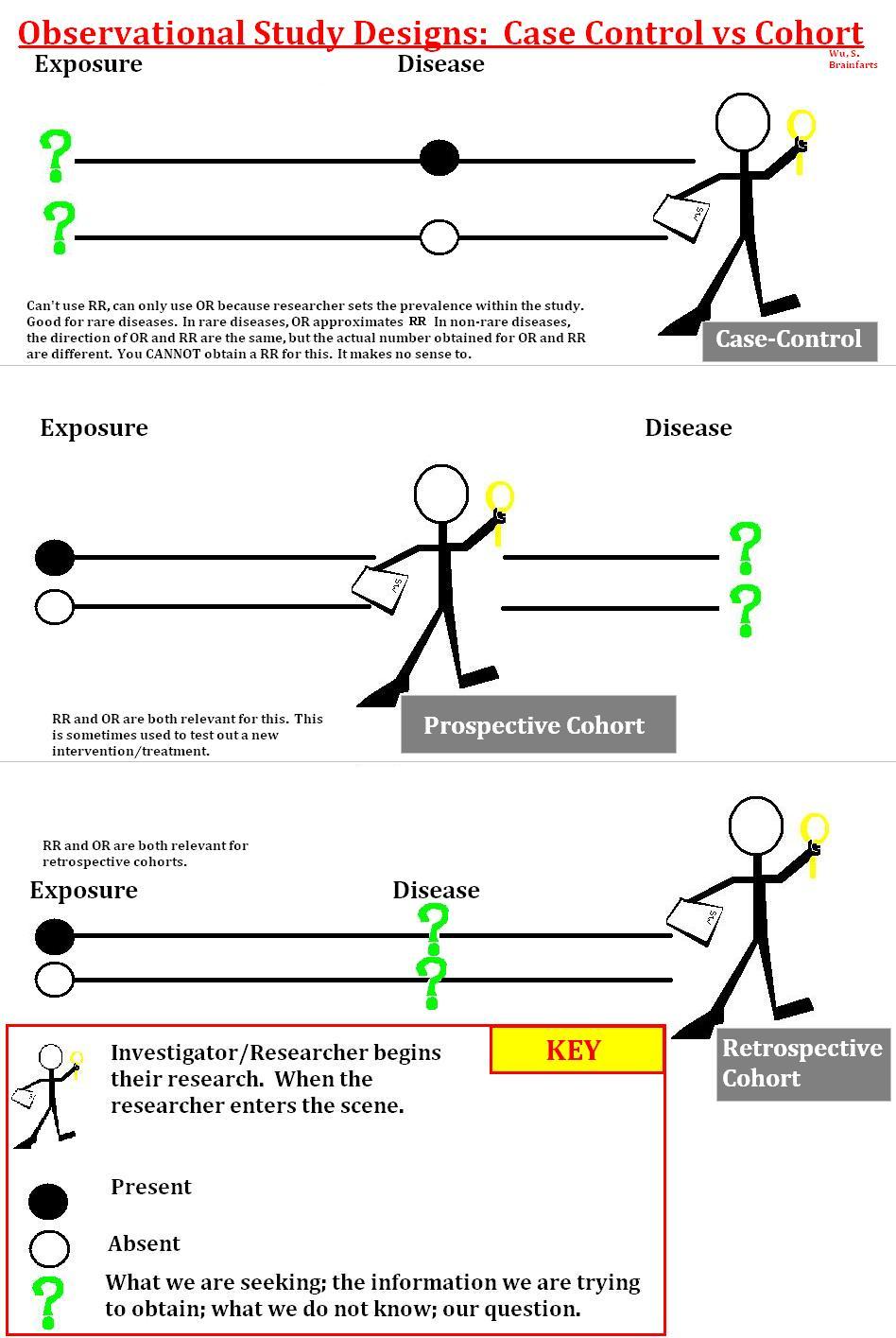Prospective Cohort Study
A Prospective Cohort Study is a longitudinal cohort study that follows a study cohort (where cohort assignment precedes outcome evaluation).
- Context:
- It can involve (typically) Cohort Assignment near the Experiment Start.
- It can be analyzed by a Prospective Analysis Task.
- Challenges: loss to follow up; differential nonresponse; can require long-term funding; continually improving methods for detecting exposure (leading to greater misclassification than would be expected in current practice)
- …
- Example(s):
- Counter-Example(s):
- See: Predictive Analytics, Observational Study.
References
2022
- (Wikipedia, 2022) ⇒ https://en.wikipedia.org/wiki/Prospective_cohort_study Retrieved:2022-1-8.
- A prospective cohort study is a longitudinal cohort study that follows over time a group of similar individuals (cohorts) who differ with respect to certain factors under study, to determine how these factors affect rates of a certain outcome.[1] For example, one might follow a cohort of middle-aged truck drivers who vary in terms of smoking habits, to test the hypothesis that the 20-year incidence rate of lung cancer will be highest among heavy smokers, followed by moderate smokers, and then nonsmokers.
The prospective study is important for research on the etiology of diseases and disorders. The distinguishing feature of a prospective cohort study is that at the time that the investigators begin enrolling subjects and collecting baseline exposure information, none of the subjects have developed any of the outcomes of interest. After baseline information is collected, subjects in a prospective cohort study are then followed "longitudinally," i.e. over a period of time, usually for years, to determine if and when they become diseased and whether their exposure status changes outcomes. In this way, investigators can eventually use the data to answer many questions about the associations between "risk factors" and disease outcomes. For example, one could identify smokers and non-smokers at baseline and compare their subsequent incidence of developing heart disease. Alternatively, one could group subjects based on their body mass index (BMI) and compare their risk of developing heart disease or cancer. Prospective cohort studies are typically ranked higher in the hierarchy of evidence than retrospective cohort studies [2] and can be more expensive than a case–control study. One of the advantages of prospective cohort studies is they can help determine risk factors for being infected with a new disease because they are a longitudinal observation over time, and the collection of results is at regular time intervals, so recall error is minimized.
- A prospective cohort study is a longitudinal cohort study that follows over time a group of similar individuals (cohorts) who differ with respect to certain factors under study, to determine how these factors affect rates of a certain outcome.[1] For example, one might follow a cohort of middle-aged truck drivers who vary in terms of smoking habits, to test the hypothesis that the 20-year incidence rate of lung cancer will be highest among heavy smokers, followed by moderate smokers, and then nonsmokers.
- ↑ Cite error: Invalid
<ref>tag; no text was provided for refs namedurlDefinition of prospective cohort study - NCI Dictionary of Cancer Terms - ↑ .http://content.karger.com/ProdukteDB/produkte.asp?Aktion=ShowFulltext&ArtikelNr=235241&ProduktNr=228539
2018
2014
- (Kalogeropoulos, 2014) Andreas Kalogeropoulos (2014). "Understanding Retrospective vs. Prospective Study designs" (Talk)
- QUOTE: Retrospective vs. Prospective.
- Retrospective:
- The outcome has already happened (by the time of study design)!
- Practically, you just dig into data (~EHR)
- Can only be observational.
- Prospective:
- Interventional (has to be prospective)
- Observational
- Retrospective:
- QUOTE: Retrospective vs. Prospective.
2010a
- (AMTA, 2010) ⇒ American Massage Theory Association. (2010). “Glossary of Research Terminology."
- QUOTE: Prospective Cohort Design: One of three possible designs considered to be ex post facto (or after the fact) designs. In this design the two or more comparative groups are formed in the present based on an already existing exposure to treatment/condition variations and then followed forward into the future with a view toward one or more outcomes being measured.
2010b
- https://onlinecourses.science.psu.edu/stat507/node/54
- QUOTE: Prospective cohort(concurrent; longitudinal study) - An investigator identifies the study population at the beginning of the study and accompanies the subjects through time. In a prospective study, the investigator begins the study at the same time as the first determination of exposure status of the cohort. When proposing a prospective cohort study, the investigator first identifies the characteristics of the group of people he/she wishes to study. The investigator then determines the present case status of individuals, selecting only non-cases to follow forward in time. Exposure status is determined at the beginning of the study.
2009
- (Barratt & Kirwan, 2009) ⇒ Helen Barratt, and Maria Kirwan. (2009). “Cohort Studies: Design, Applications, Strengths & Weaknesses of Cohort Studies.” In: http://www.HealthKnowledge.org.uk
- QUOTE: Prospective cohort studies – participants are identified and followed up over time until the outcome of interest has occurred, or the time limit for the study has been reached. A temporal relationship between exposure and outcome can thus be established.
